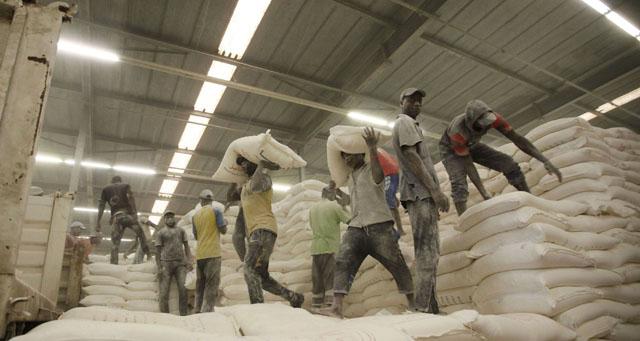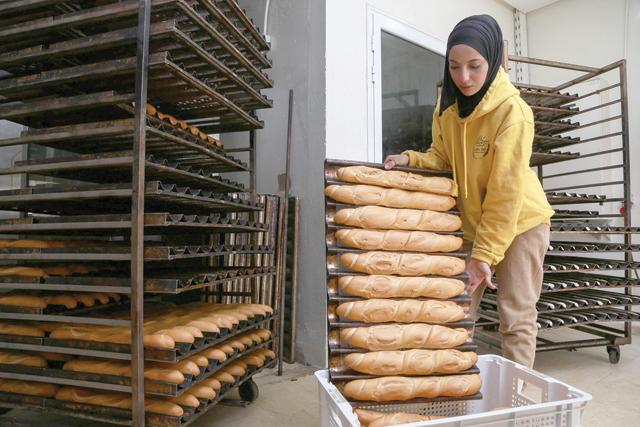You are here
Libya struggles to keep electricity on
By Reuters - Feb 11,2015 - Last updated at Feb 11,2015

TRIPOLI — Libya's electricity grid is struggling to keep going as a shortage of power and gas for generation and its break up under two governments hit supply.
Residents in the two main cities Tripoli and Benghazi say they have been coping for days with outages lasting 10 hours or longer. Mobile phone coverage in parts eastern Libya broke down this week due to a lack of electricity.
"The network has been broken up in separate regions which has a negative impact, is leading to instability and cases of total blackouts," Libya's state electricity firm said on its website.
It gave no details but officials have complained that power plants have been hit or become inaccessible due to nearby clashes.
Some plants such the one in Hun in central Libya have stopped working due to insecurity, the firm added.
Libya had tried overhauling the grid but a departure of foreign partners for security reasons made the completion of projects impossible, the company continued, without giving details.
Oil production has fallen to around 350,000 barrels a day, a fifth of levels seen in 2013 as major export ports stopped working in the past few months due to nearby fighting.
Gas output has also fallen sharply since the Es Sider port, Libya's biggest, and its connected fields shut down in December when a force allied to the Tripoli government tried to seize the terminal.
Foreign firms have become reluctant to deal with Libya. Last week, gunmen stormed the Al Mabrouk oil field, kidnapping three Filipinos and killing around 10 people, officials have said.
Separately, a top official said Libya will exhaust its wheat reserves in two or three months unless a state fund tasked with ensuring supplies receives money held up as a result of the political turmoil gripping the country and a slump in oil revenues.
Neither side, the recognised government holed up in the east since losing the capital in summer or a rival outfit now running Tripoli, has prepared a budget for this year. Both are busy fighting for territory, oil facilities, and control of the central bank and the country's vital oil revenues.
Wheat imports have been disrupted by fighting between the rival factions. Air strikes on the western port of Misrata have made shippers reluctant to deal with Libya, while local banks suffer from a dollar shortage due to a slump in oil revenues.
As a result, Libya has been forced to halve flour supplies to bakeries to 65,000 tonnes a month. Despite this, the country's wheat reserves will run out within a maximum of three months without fresh supplies.
Jamal Al Shibani, head of the state Price Stabilisation Fund (PSF), which provides finance for mills importing wheat, played down talk of a crisis, but told Reuters there was a shortage of flour.
"We have flour security for one month and we have wheat reserves which I expect to last until the start of April," he indicated.
In an indication of the difficulties of bringing in imports, a state agency has been trying for three weeks to buy 50,000 tonnes of milling wheat and 25,000 tonnes of rice but payment issues have prevented a deal, European traders have said.
A budget crisis has undermined the funding of imports. The power struggle has knocked out almost all oil fields. Oil exports, Libya's lifeline, have fallen to around 200,000 barrels a day — a fifth of the levels seen in 2013.
Obligations
Shibani said the central bank, which is limiting spending as oil receipts decline, had stopped transfers to his fund, leaving it with obligations of more than 3 billion dinars ($2.2 billion) owed to millers or wheat importers.
For three months the PSF had been waiting for the release of 200 million dinars as a short-term financing facility.
"If our financial obligations are not met, [wheat] reserves will run out in two or three months," he added. "We know that Libya, the state, cannot pay everything [but] there are bank obligations. The obligations need to be paid in tranches."
State-owned Matahan, a Tripoli-based mill which buys wheat abroad, said it had received a shipment of 25,000 tonnes of wheat from Hungary this week, with another cargo expected later this month.
But Chairman Mustafa Abdul Majid Idris said the state had failed to guarantee 32 million dinars it had opened as a letter of credit. Its bank was now threatening to charge interest should it fail to come up with the funds.
The mill has debts of 173 million dinars due to unpaid state bills.
With no fresh money arriving, Shibani has become a crisis manager on all fronts. He spent hours on Monday meeting African storage workers, who are on strike because they have not been paid since October.
"Our accounts have been completely frozen but I managed to persuade them to return to work," he said. But a Reuters reporter visiting a flour storage facility on Tuesday saw the workers still refusing to unload almost 20 trucks. "We'll work when we get paid," one worker told a manager pleading with them to resume work.
Shibani said there was no bread crisis. Loaves are available, although some bakeries in Tripoli and Benghazi have closed while those still working produce less bread.
The biggest headache for authorities is that Libya has probably the world's highest bread consumption. A loaf is sold for 2 cents, a legacy from the time of Qadhafi, who wanted to buy loyalty by subsidising basic food items.
Each Libyan consumes 15 kilogramme of flour a month. "The closest runners-up are countries with a consumption of five or six kilogrammes," Shibani indicated.
Libyans are used to buying plastic bags full of bread, much ends up in garbage bins or is used as animal feed. Even worse, bread subsidies are a major source of corruption.
Traders smuggle trucks full of flour to southern neighbours Niger and Chad. "They do not need to import any wheat," said Idris.
Libyan officials have been saying for years that the subsidy system is too expensive, but with armed groups effectively running the country nobody dares to touch it.
Shibani also said imports of sugar, macaroni and other subsidied products had stopped, although stocks were available.
Related Articles
A power struggle between two rival governments that threatens to tear Libya apart has started to take its toll on Misrata, an important shipping and industrial hub that had shrugged off the turmoil until now.
BEIRUT — Michael Hamati emerged from a long queue at a Beirut bakery sweat dripping from his forehead, as Lebanon's economic collapse sparks
TUNIS — Households across North Africa are rushing to stock up on flour, semolina and other staples as food prices rise following Russia's i

















